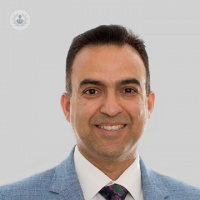When is adenoid surgery required?
Autore:Enlarged adenoids commonly affect children, causing a range of symptoms from a blocked nose to a stiff neck. In his latest article, leading ENT surgeon Mr Gaurav Kumar explains this condition as well as the surgery that is done to fix it.

When is adenoid surgery required?
Adenoids are part of the immune system, just like our tonsils. A child suffering from an enlarged adenoid can suffer from the following symptoms:
- Enlarged adenoids can lead to a blocked nose. As a result of this, the child may develop bad breath, in addition to thick secretions from the nose.
- Enlarged adenoids can affect a child's sleep quality, leading to sleep apnoea and snoring. They may breathe like "Darth Vader".
- Enlarged adenoids can block the Eustachian Tube. The Eustachian Tube is responsible for maintaining air pressure in the middle ear. Enlarged adenoids can contribute to glue ear and frequent ear infections.
How is adenoid surgery done?
Adenoid surgery is done as a day-case procedure under general anaesthesia. The procedure itself takes 20-30 minutes. ENT doctors can perform adenoid surgery through the mouth or the nose with the help of an endoscope. The child should be able to go home the same day with regular painkiller medications.

What are the side effects of having your adenoids removed?
In general, adenoid surgery is a safe procedure. Adenoid surgery is commonly performed on children between the ages of 1 -8 years old. The primary complications of adenoid surgery are bleeding, infection, recurrence and anaesthetic risk. Some children complain of nasal congestion for a few days to weeks. In some cases, the child may complain of earache, as the throat and ear have the same nerve supply. This earache can be managed well with painkillers.
Can adenoid removal affect speech?
Having adenoid surgery tends to improve airflow through the nose. After adenoid surgery, the child will move towards more natural speech.
What if I decide for my child not to have adenoid surgery?
The great news is adenoids shrink with age. In most cases, symptoms can be managed using a saline nasal spray, with or without nasal steroid drops. Other factors which can help your child's symptoms are hydration and humidification of room air.
When should I contact the hospital after my child's adenoid surgery?
You should contact your doctor or emergency contact number if you notice that your child is spitting fresh blood, complains about neck stiffness, has a temperature that is not getting better with Paracetamol, or if the child is not passing enough urine.
Mr Gaurav Kumar is a leading ENT surgeon based in Essex & London, with over 25 years of experience. If you would like to book a consultation with Mr Kumar you can do so today via his Top Doctors profile.


